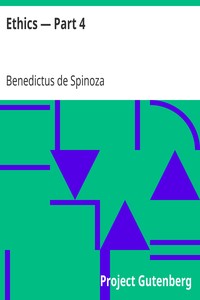Ethics — Part 4 by Benedictus de Spinoza
"Ethics — Part 4" by Benedictus de Spinoza is the fourth part of a philosophical treatise written between 1661 and 1675. Building on his radical ideas about God, nature, mind, and emotions, Spinoza addresses human bondage and the power of the passions. He examines how inadequate ideas and emotions enslave us, preventing us from achieving true freedom and virtue. Through geometric demonstrations, he explores the struggle between reason and passion, offering insights
into human nature's constraints and possibilities for liberation. (This is an automatically generated summary.)
Read or download for free
| How to read | Url | Size | |||
|---|---|---|---|---|---|
| Read now! | https://www.gutenberg.org/ebooks/971.html.images | 160 kB | |||
| EPUB3 (E-readers incl. Send-to-Kindle) | https://www.gutenberg.org/ebooks/971.epub3.images | 116 kB | |||
| EPUB (older E-readers) | https://www.gutenberg.org/ebooks/971.epub.images | 116 kB | |||
| Kindle | https://www.gutenberg.org/ebooks/971.kf8.images | 217 kB | |||
| older Kindles | https://www.gutenberg.org/ebooks/971.kindle.images | 207 kB | |||
| Plain Text UTF-8 | https://www.gutenberg.org/ebooks/971.txt.utf-8 | 145 kB | |||
| Download HTML (zip) | https://www.gutenberg.org/cache/epub/971/pg971-h.zip | 113 kB | |||
| There may be more files related to this item. | |||||
About this eBook
| Author | Spinoza, Benedictus de, 1632-1677 |
|---|---|
| Translator | Elwes, R. H. M. (Robert Harvey Monro), 1853- |
| Title | Ethics — Part 4 |
| Note | Wikipedia page about this book: en.wikipedia.org/wiki/Ethics_(Spinoza_book) |
| Credits | Produced by an anonymous Project Gutenberg volunteer |
| Reading Level | Reading ease score: 63.1 (8th & 9th grade). Neither easy nor difficult to read. |
| Language | English |
| LoC Class | B: Philosophy, Psychology, Religion |
| Subject | Ethics |
| Category | Text |
| EBook-No. | 971 |
| Release Date | Jul 1, 1997 |
| Most Recently Updated | Apr 14, 2013 |
| Copyright Status | Public domain in the USA. |
| Downloads | 304 downloads in the last 30 days. |
| Project Gutenberg eBooks are always free! | |

